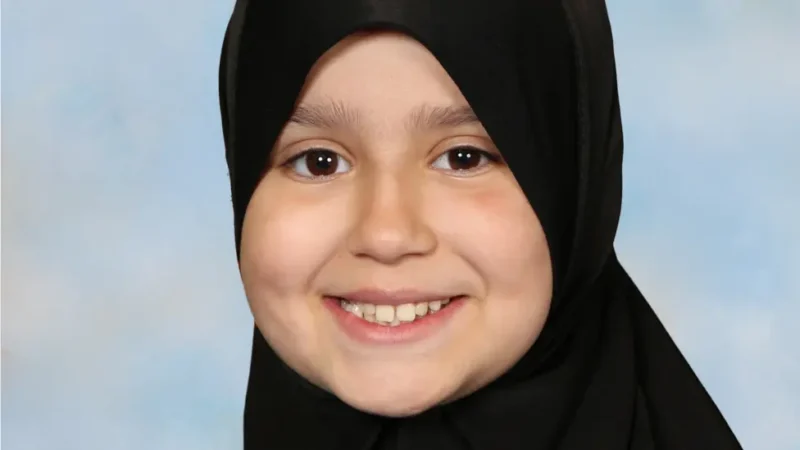Council officers attempted to carry out an elective home education visit to Sara Sharif’s home the day before she was murdered, but went to the wrong address despite the school providing the correct one, a review has found.
Ten-year-old Sara was murdered by her father Urfan Sharif and stepmother Beinash Batool in 2023 after two years of abuse. She had been known to Surrey County Council’s children’s services before she was born.
A child safeguarding practice review published this week found there were “clearly several points in Sara’s life, in particular during the last few months, where different actions could and should have been taken” by authorities.
It also suggested a register of all children not in school – planned as part of Labour’s children’s wellbeing and schools bill – “would not have protected Sara”.
Officers visited wrong address
On April 17, 2023, Sara’s parents informed St Mary’s Primary School in West Byfleet that they wanted her to be home educated.
The school then completed a referral form which gave the family’s new address to Surrey County Council’s inclusion team to carry out an elective home education visit.
According to the council’s protocol, Sara would remain on the school roll until a home visit was completed to confirm she should be removed within 10 days.
This went beyond Department for Education guidance at the time, which stated that parents did not need to inform schools of their intent to home educate.
But this was delayed multiple times over the next four months, until a visit was attempted, but at the family’s previous address. Council officers realised the mistake once they returned and planned for a further visit to the correct address in September.
Sara was found dead at her home on August 10.
The review said there “can now be no doubt that Sara’s father and stepmother used home education to keep Sara hidden from view in the last weeks of her life”.
Had the proper procedures been followed “it is likely that the abuse of Sara would have come to light,” the review added.
Catalogue of concerns from school
Before this, the school had made multiple enquiries with the council and family with concerns for Sara’s safety.
In 2021, Sara started wearing a hijab to school after a visit to Pakistan.
The review said the headteacher was “proactive in questioning this change” and called home to ask about it. The headteacher was told it was Sara’s choice, as Sara said she had developed a “fascination with the culture and food”.
In June 2022, Sara’s class teacher noticed a bruise under on left eye, which Sara said had been caused by a younger sibling. The school’s designated safeguarding lead believed there was no safeguarding concern, the review said.
That same month, Sara’s parents were told she was working below age-related expectations. Following this, Sara’s father said he wished to home school his daughter.
The review said he “gave various reasons, including concerns about bullying and that Sara had worked well at home during lockdown”.
The headteacher met with Sara’s father and stepmother where she shared concerns about the plan to home school her, but the decision was referred to the council.
As the council delayed its handling of the case over the summer, Sara’s father said he wanted her to return to school in September 2022.
Then in March 2023, Sara was absent from school for two days, which her parents said was due to illness.
But upon her return, the headteacher and designated safeguarding lead “noticed Sara had her scarf pulled down over her face and her demeanour had changed – she was quiet and coy”.
Sara said her sibling had punched her, which caused the headteacher to call her stepmother, where “differing explanations” were given about the bruising.
The headteacher eventually referred to the council’s children services for advice, which resulted in Sara being given a social worker.
Law changes ‘would not have protected Sara’
The government’s children’s wellbeing and schools bill will introduce a mandatory register of children not in school and give local authorities more power to assess home education and intervene if they deem it unsuitable.
But a Schools Week investigation in January found some councils do not have dedicated home education staff.
The review said measures in the bill “contribute to improving the interface between the rights of parents to educate at home and safeguarding children,” but that a national register “would not have protected Sara”.
It cited evidence from the Local Government Association which said councils should be given powers to speak to children directly to check they are safe.
The review also said the Department for Education should require a formal meeting with parents and professionals to assess support needs for children previously known to children’s social care.
All parents with parental responsibility should be consulted when deciding to educate a child at home, it also recommended.
Further recommendations were made for home visits to take place within two weeks of notification of withdrawal from school.
‘We are deeply sorry’

Terence Herbert, the chief executive of Surrey county Council, said the authority was “deeply sorry” and takes findings “with utmost seriousness”.
Education Secretary Bridget Phillipson said the review “rightly highlights the glaring failures and missed opportunities across all agencies”.
“This government is treating the findings of the Review with the strongest possible seriousness. We are already acting to close gaps, to strengthen safeguarding and to keep children safe,” Phillipson said.








Your thoughts